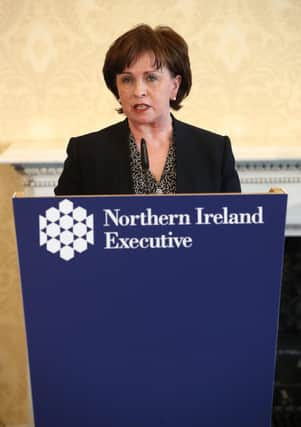Dodds: Stormont grant schemes could never cover all businesses


Diane Dodds also warned that the downturn would be like no other Northern Ireland has ever experienced, with the prospect of “catastrophic consequences” if action was not taken to restart the economy.
During an appearance before the Assembly’s ad hoc committee on the Covid-19 emergency, the minister faced several calls from MLAs to extend the remit of Stormont’s grant initiatives to encompass various business owners who are not currently eligible to apply.
Advertisement
Hide AdAdvertisement
Hide AdMrs Dodds earlier told the committee that the £10,000 grant scheme for small businesses had paid out to 19,000 of the 21,000 businesses that had applied, at a cost of £190 million.
She said her department had received more than 3,000 applications for the executive’s £25,000 grant scheme for the tourism, hospitality and retail sectors, and had paid out 800 times so far.
Earlier this week, the minister announced that the Executive had agreed to provide a further £40 million for a support fund for microbusinesses.
Mrs Dodds said Invest NI was building an online portal for businesses to apply for that scheme, expressing hope it would be launched next week.
Advertisement
Hide AdAdvertisement
Hide AdOn Wednesday, Belfast Chamber chief executive Simon Hamilton highlighted that only a third of businesses in the city were eligible to apply for the various schemes, given that large companies had been excluded.
In response to one of several committee questions on the prospect of extending the remit to cover more local businesses, Mrs Dodds acknowledged there were “gaps”.
“These schemes will never cover everybody, the business community here is very wide, very diverse and encompasses a huge section of businesses,” she said.
Mrs Dodds said all businesses had benefited from a three-month rates holiday implemented by the Executive.
Advertisement
Hide AdAdvertisement
Hide AdIn an address to committee members, Mrs Dodds insisted the Executive’s top priority remained the preservation of life.
“And this will remain our primary focus until such times that the threat of Covid-19 has sufficiently diminished,” she said.
“Our next, and necessary, priority is to mitigate the impacts on our economy as best we can and do all in our power to aid recovery.
“We have lived through downturns before but this is different. The usual remedy of encouraging people to go out and spend money to boost the economy is not possible, or indeed appropriate, right now.”
Advertisement
Hide AdAdvertisement
Hide AdShe said Northern Ireland’s economy was in “uncharted waters and normal rules no longer apply”.
“By effectively putting our economy in a deep freeze, allowing employers to retain staff by furloughing them, we have ushered many businesses away from failure,” she said.
“However, there is a direct link between the population’s health and the health of the economy. The longer people are away from the workplace the greater the impact will be on our economy.”
She added: “We are prepared for the possibility that economic recovery will not be as rapid as the decline. Government, both nationally and locally, will again need to support businesses across various sectors.
Advertisement
Hide AdAdvertisement
Hide Ad“The darkest days of this economic disaster are not all behind us yet. We still need to help businesses survive. Incomes must be protected. But we also need to start plotting a course to recovery.
“Yes, our focus is still on fighting the most immediate and severest impacts of this crisis but it is important that we also start to get the economy moving again and gradually see people safely return to work.
“The truth is that we don’t know for certain how long this disruption will last, but we simply cannot shut the economy down for a significant period of time without suffering catastrophic consequences.
“We stand ready to facilitate a safe return to work – when the time is right.”
Advertisement
Hide AdAdvertisement
Hide AdThe minister said the issues should not be viewed as a trade-off between people’s health and the economy.
“The two are inextricably linked and it is important that government, business and wider society recognises and accepts that,” she said.